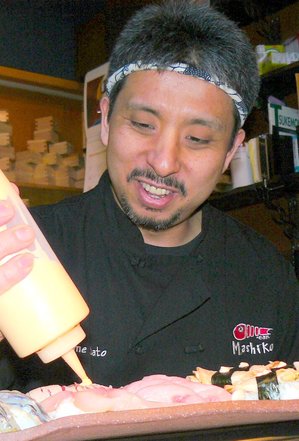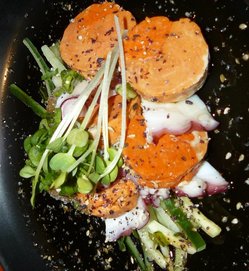This week's news: a sushi chef in Santa Monica is charged with selling whale meat. Last week's news: European countries want to ban the fishing of bluefin tuna.
 We are global omnivores, are we not? Eating our way indiscriminately around an international buffet of cuisines, pizza one night, tacos the next, our noses twitching at fancified French, then embracing Japan's briny simplicity. Sushi, in fact, has become as American as apple pie; with beginners nibbling on inglorious California rolls while passionate partisans seek out the bliss of bluefin tuna.
We are global omnivores, are we not? Eating our way indiscriminately around an international buffet of cuisines, pizza one night, tacos the next, our noses twitching at fancified French, then embracing Japan's briny simplicity. Sushi, in fact, has become as American as apple pie; with beginners nibbling on inglorious California rolls while passionate partisans seek out the bliss of bluefin tuna.
If Sherlock Holmes could solve a crime because of the dog that didn't bark, Hajime Sato is running a sushi bar in West Seattle, Mashiko, without the industry's most famous animal. Call it the fish that didn't swim. At the heart of the international sushi experience, supposedly, swims maguro, the foie gras goose of sushi, the giant bluefin tuna with a fatty belly. But it was not always so; the ancient samurai considered bluefin unclean. And bluefin today is overfished, endangered, the subject of vitriolic debate. Yet the Japanese taste for soft, buttery bluefin tuna is relatively recent (post-World War II), when Japanese fishing vessels could venture far afield and track down the elusive bluefin, which sells for astronomical prices at the fish market in Toyko. Pre-war, Japanese palates had been satisfied with smaller, more affordable fish from local waters.
No one questions the fact that o-toro is delicious, but "We are loving it to death," writes the environmental activist Casson Trenor in his 2008 book, Sustainable Sushi "The bottom line is that bluefin is more than a delicacy, it is an essential but extremely vulnerable part of our ocean ecosystem. it should be venerated and protected, not wiped from the face of the deep in a relentless crusade of greed and gluttony." The oracle of the ocean (a Washington native who now lives in San Francisco), Trenor found an eager disciple in Hajime Sato, a lad from the Tokyo suburbs who opened his own place in West Seattle 15 years ago and who followed Trenor's suggestion to transform Mashiko from one of 200 sushi parlors in Seattle alone to one of only three "sustainable sushi" restaurants in the entire country.
 As recently as eight months ago, a diner here could swoon over a gorgeous dish of pink monkfish liver medallions atop thinly sliced octopus (we took the photo on the left in 2008). No more. Neither is sustainable; they're both off the menu. But there's no self-conscious political correctness at Mashiko. You don't miss the fish because, after all, you're eating fish. It's not like going to a vegetarian restaurant and ordering "pork chops" made form tofu.
As recently as eight months ago, a diner here could swoon over a gorgeous dish of pink monkfish liver medallions atop thinly sliced octopus (we took the photo on the left in 2008). No more. Neither is sustainable; they're both off the menu. But there's no self-conscious political correctness at Mashiko. You don't miss the fish because, after all, you're eating fish. It's not like going to a vegetarian restaurant and ordering "pork chops" made form tofu.
So let's look, instead, at a couple of the fish that Chef Sato does serve. Catfish, first. Farm-raised, And it substitutes for, of all things, eel. Now, you might not think that eel, wriggly things that ought to to survive anywhere in the universe, would be endangered, but they are. So Hajime (as he prefers to be called) looked for a sustainable alternative and found catfish, long considered a junk fish raised in muddy ponds of backward, backwater southern states. But no. Mashiko's catfish come from the ecologically correct Carolina Classics catfish farm in North Carolina, where a closed system is used to purify the water, and the fast-growing fish are raised without antibiotics (they're the rabbits, if you will, of the sea). The catfish makes an appearance atop the $9 Southern Roll: tempura sweet potato, avocado, and "namagi," a made-up word that combines namazu (catfish) and unagi (eel).
 The star of the show, on a recent visit, was a salmon and asparagus roll, $10, which combined asparagus and tobiko with slices of bright red salmon, tightly rolled not in the usual black nori (seaweed) but in a rice paper called mamenori, then handed over to the kitchen, where it was tempura-battered and lightly fried in peanut oil until the surface was barely crisp. Cut into sections like most rolls, the roll was plated with soba noodles and a light broth of soy sauce, shiitake-kombu (mushroom-kelp) stock and ginger. The salmon was a farmed coho from SweetSpring Salmon, a Washington State company that's pioneering so-called "closed system" fish farms that avoid polluting coastal waters by operating miles inland. The layering of flavors was remarkable, enhanced by the contrasting mouthfeel of the tempura, the salmon, the asparagus and the tobiko. No, it wasn't o-toro, it wasn't monkfish liver, it wasn't foie gras. But it did provide a rich, intense and memorable experience.
The star of the show, on a recent visit, was a salmon and asparagus roll, $10, which combined asparagus and tobiko with slices of bright red salmon, tightly rolled not in the usual black nori (seaweed) but in a rice paper called mamenori, then handed over to the kitchen, where it was tempura-battered and lightly fried in peanut oil until the surface was barely crisp. Cut into sections like most rolls, the roll was plated with soba noodles and a light broth of soy sauce, shiitake-kombu (mushroom-kelp) stock and ginger. The salmon was a farmed coho from SweetSpring Salmon, a Washington State company that's pioneering so-called "closed system" fish farms that avoid polluting coastal waters by operating miles inland. The layering of flavors was remarkable, enhanced by the contrasting mouthfeel of the tempura, the salmon, the asparagus and the tobiko. No, it wasn't o-toro, it wasn't monkfish liver, it wasn't foie gras. But it did provide a rich, intense and memorable experience.
Mashiko is actually far more than sushi bar. There's a whole izakaya side of the menu with Japanese gastropub fare ($4 fried fish ribs with curry salt, $4 chicken yakitori, $5 spinach and bonito Ohitashi, $7 pork potstickers). Seven or eight "small bowls" ($8 smoked turbot and blue cheese) in addition to soups, curries, tempura and bento boxes. I counted half a dozen folks in the kitchen, and, at Hajime's side, a female sushi chef, Mariah Kmitta. Well, why not, unless you're an unreconstructed segregationist, in which case you probably wouldn't have set foot inside Mashiko in the first place. After all, Rule #1, posted on his website, is "Mashiko is a non-discriminatory establishment" and Rule #21 is "Because Hajime said so." There's also a sign at the door that says "Please wait to be seated, unless you are an idiot and can't read." (An online comment at TheStranger.com found it "so offensive that we nearly walked out.") Point being, this is not a traditional spot like the old Shiro's or the defunct Saito's, nor a hybrid like I Love Sushi or Wasabi Bistro. It's irreverent. The website is called SushiWhore.com. Hajime's email moniker is sushipimp. There's a live webcam of the diners at the sushi bar, for heaven's sake. Mashiko's motto, after all, is "Shut up and eat."
Hajime Sato recognizes that his path is perilous. "Everybody's watching me, to see if I can survive," he admits, although, on a recent Saturday, there was a line out the door most of the evening. The faithful, they follow their prophet.
A final note: yes, there's one of those hi-tech Japanese toilets in the ladies room, the kind that, I've been told, spritzes your hoo-ha and dries it with warm air. Standard fixture in Japan, apparently. The men's room urinal, on the other hand, is a traditional American Standard.

Leave a comment